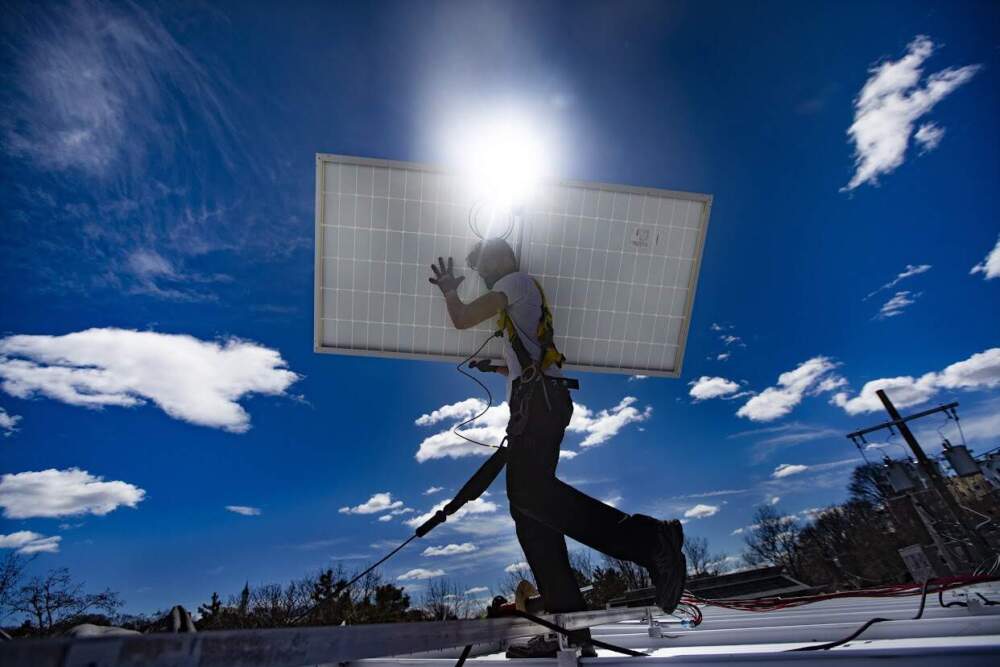Advertisement
Boston's Morning Newsletter
Want to take out a loan from Massachusetts' new 'green bank'? Here's how it works

Editor's Note: This is an excerpt from WBUR's daily morning newsletter, WBUR Today. If you like what you read and want it in your inbox, sign up here.
The Celtics now have a 3-1 lead in their first-round playoff series, but no one is celebrating too much until we learn more about Kristaps Porzingis’ injury last night. (FWIW, the big man is downplaying the severity.) Let’s cross our fingers and get to the news:
Easier being green: Massachusetts’ “green bank” is now open for business. As WBUR’s Barbara Moran reports, the state’s budding Community Climate Bank launched a new program yesterday offering loans to help low- and moderate-income homeowners make clean energy improvements to their homes. The $20 million program — the bank’s first consumer offering — will hand out low-interest loans of up to $100,000 for eligible projects.
- What kind of projects? The loans are good for anything from home weatherization to heat pumps to electric ovens to solar panels to EV charging stations. “The home loan program covers almost any energy-related improvement you can think of — so long as the combined project helps that customer save at least 20% in total energy costs,” Maggie Super Church, the green bank’s policy director, told Barb. The bank will also help loan recipients navigate the maze of available clean energy rebates and tax credits.
- Am I eligible? Homeowners earning up to 135% of the local area median income can apply for the program, but the exact income limit varies by county (as much as $190,775 in the Boston area to $124,875 in the Berkshires). The loans can also only be used for projects on your primary home, including owner-occupied multifamily homes with as many as four residential units.
- Terms and conditions: Loan interest rates run from 0.5% to 2%, depending on household income. They also have a 20-year term, which officials say should mean low monthly payments.
- The big picture: The goal is to lend 1,000 loans over the next two years, as part of the state’s push to reach net-zero emissions by 2050. Homes and buildings are the second-largest source of greenhouse gas emissions in Massachusetts.
In the zone: Andover is holding a special town meeting tonight to vote on a rezoning plan that would bring the town into compliance with the MBTA Communities Act. It’s the latest test of suburban residents’ appetite for the state law encouraging denser housing.
- What happens if voters say yes? The zoning changes would allow multi-family housing to be built “as of right” by Andovers’s Ballardvale and downtown commuter rail stations, as well as what’s currently a business district off I-93. In theory, the changes could bring over 2,000 new units of housing to the town (though experts say it’s unlikely that many will actually be built).
- What happens if voters say no? As a “commuter rail community,” Andover has until the end of this year to comply with the law, so — unlike Milton — they wouldn’t immediately face any harsh state penalties or lawsuits. Andover officials told The Eagle Tribune they would go back to the drawing board and draft a new plan if the current proposal is rejected tonight.
Cass 3.0: State officials are planning to make upgrades to the Roxbury recreational complex that’s currently — and controversially — being used as a migrant overflow shelter. When it reopens to the public, the Melnea Cass Center will get a new gym floor, better Wi-Fi, a digital entrance sign, tree plantings and solar panels, reports WBUR’s Simón Rios. “We really appreciate the fact that the community was willing to share this valued facility with families that have been in need for the last several months,” Department of Conservation and Recreation Commissioner Brian Arrigo told Simón.
- What’s next: The shelter is slated to close by May 31, and officials plan to reopen the center’s pool in June. Arrigo says they’re aiming to finish the improvement project by Labor Day.
Reach the beach: People planning to visit Wellfleet’s popular Marconi Beach over the next few weeks will face a tricky trek. Cape Cod National Seashore is closing the gate to Marconi Beach Road today through May 23 so workers can replace the stairs to the beach. That means you’ll have a two-mile walk each way from the nearest access point to get to the beach, according to the Cape Cod Times.
P.S.— WBUR won first-place National Headliner Awards for our recent coverage of public housing and supervised consumption sites. Read more about the winning stories and why they were recognized.
